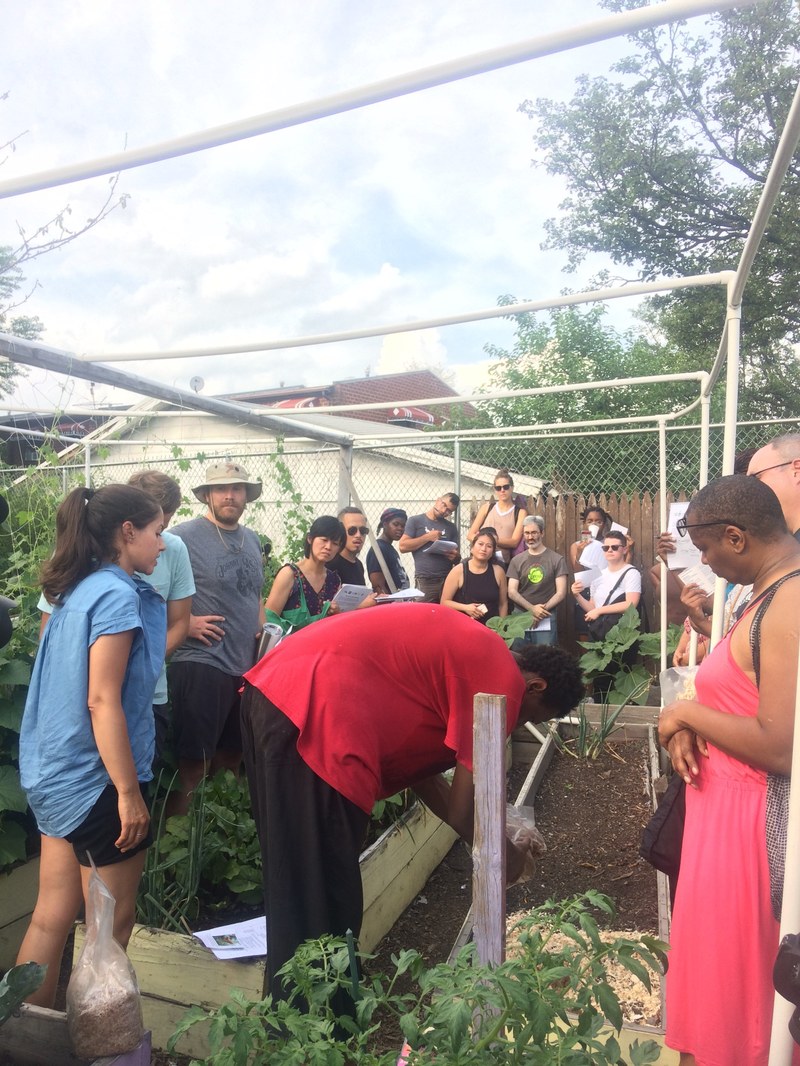Posted: November 10, 2022
Yolanda Gonzalez is an Urban Agriculture Specialist with Cornell Cooperative Extension (CCE) based in New York City. She works across NYC to build and support the "layered benefits" urban agriculture. This article highlights some of the work she has done to support network building and knowledge sharing to build more resilient urban food systems in the city, with a focus on collaborative and collective learning among growers and communities.

Yolanda Gonzalez, an Urban Agriculture Specialist with Cornell Cooperative Extension
by Kendall Van Son and Justine Lindemann
According to Yolanda Gonzalez, an Urban Agriculture Specialist with Cornell Cooperative Extension (CCE) in New York City, the resilience of urban agricultural production in New York comes in part from the “layered benefits” and different purposes that urban agriculture serves across the city. She understands the benefits and resilience emerging from urban agriculture initiatives through a lens of her background in small-scale farming and policy and environmental science, which means that she understands resilience as simultaneously social and ecological. Gonzalez joined Extension because of her interest in working directly with farmers. She saw the opportunity Extension could provide to growers through education, training, and networking.

Gonzalez worked previously as a chapter leader in Upstate NY with the National Young Farmers Coalition, which gave her first-hand experience with the potential of knowledge sharing and peer-to-peer support as educational and training opportunities for growers. Through CCE, she has continued to promote farmer education through peer-to-peer education while also providing technical assistance.
Extension fills a demand for education and technical resources through its strengthens in resources and connections. This education does not just come in the form of knowledge pouring from Extension into the community; community-wide and peer-to-peer experience and knowledge sharing are just as, if not more important to the resilience of growers and their communities than the technical assistance that Extension can offer.
Inspired by an agroecology conference in Cuba, Gonzalez co-lead The Urban Farmer-to-Farmer Summit (TUFFS), which was an “opportunity to get people together” to “learn from one another [to] spark innovation and collaboration among the urban ag community.” At the most recent gathering presenters led panels on crops and varieties, growing practices and tools, education, and programming. Afterwards, farmers had the opportunity to share pictures and talk about different crops varieties. The coming together of the urban ag community as they share their own expert knowledge with one another sparks innovation and collaboration across the community.
Gonzalez explains: “I see (urban agriculture) as resilience because I think that it serves so many different purposes. I wrote my thesis about all the various benefits of urban ag. […] I saw it as community engagement, a gathering space to connect with your fellow neighbor to talk about political issues or issues within community. And then I saw it too, as a form of resilience because you're taking ownership of your health and your food.”

Knowledge sharing creates a gathering space to build community and take ownership of the local food system. By operating outside of more traditional food system structures (namely grocery stores) that do not adequately serve some communities, growers build resilience into those communities, enabling residents to have at least some agency over their own wellness. This self-determination is seen in East New York, a neighborhood in Brooklyn with high rates of diet-related diseases. Gonzalez told the story of one resident there who took charge of her own health by growing food in her backyard. She then learned about nutrition and juicing and used that to reverse some of the symptoms of her chronic health issues. Through East New York Farms, that same resident connected with people already growing food to learn from them. This community-based structure for support and knowledge sharing is part of what helped her to succeed as a grower, and to improve her own health as a result.
Extension acts as a facilitator in this type of circular transfer of knowledge. To continue to support resilience building, Gonzalez recommends that CCE focus on environmental health in the city. This can look like focusing on the urban heat island effect and expanding the urban tree canopy in certain neighborhoods. It could look like storm water management, reducing pesticide use, and helping communities to expand ecosystem services. As impacts of climate change become more exacerbated, especially in large cities like New York, it is increasingly important to use urban agriculture to mitigate these impacts. Extension can play an important part in this expanding their reach to new audiences and encouraging research that is driven by this goal. Extension can become an advocate for urban agriculture as a means to respond to the dynamic needs of communities across the city who are striving to become more resilient.
If you would like to receive The Urban Resilience Report in your inbox, please join the listserv.

